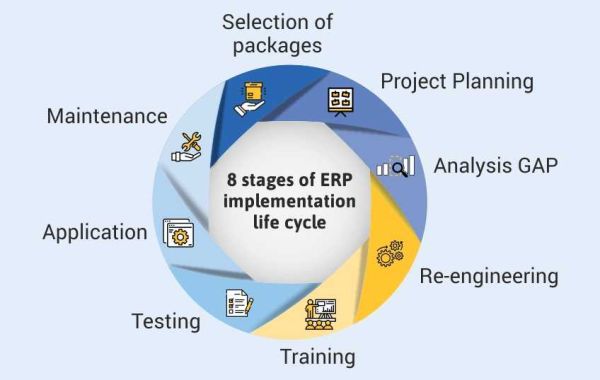Businesses today navigate a dynamic technological landscape. Selecting the right Enterprise Resource Planning (ERP) deployment approach is crucial. ERP systems manage operations like supply chain, inventory, HR, and finance. The correct ERP deployment streamlines processes, improves data accuracy, and enhances decision-making. However, businesses face a daunting task with various ERP deployment options. This blog explores different ERP deployment approaches to help you make an informed choice.
Understanding On-Premise ERP Deployment
On-premise ERP deployment involves installing and running ERP software on a company's hardware within its premises. This traditional method allows full control over the ERP environment. It offers enhanced security measures and deep customization to fit unique business processes. On-premise ERP suits companies with robust IT departments, enabling direct data access and management without external providers. While offering high customization and control, this model requires significant upfront investment in hardware and software infrastructure. Businesses must allocate resources for maintenance, upgrades, and IT support. Despite requirements, entities prioritizing data sovereignty and specific compliance demands prefer on-premise ERP. It suits organizations seeking a long-term solution, willing to invest in and manage the necessary infrastructure to support their ERP system internally.
Understanding Cloud-Based ERP Solutions
ERP deployment in the cloud utilizes internet technology. It gives companies enterprise resource planning tools. This method is very flexible. Companies can adjust resources as needed. They only pay for what they use. No big upfront costs. Employees access data from anywhere. Modern work like remote teams is easy. Maintaining the system is simpler too. Updates and security handled by provider. Companies deploy ERP faster this way. But companies must carefully choose providers. System reliability and data safety are key. Cloud ERP works well for small or mid-size businesses. Cost-effective solution that grows with company needs. Provides real-time data and analytics for strategic decisions.
Good To Read :- How Does ERP Implementation Enables You to Make Smart Decisions?
The Hybrid Approach: Mixing ERP Deployment Types
Hybrid ERP systems blend on-premise and cloud models. On-premise offers robust data security and customization. Cloud services add flexibility and scalability. This appeals to companies undergoing digital shifts. Or those with data regulations requiring local storage. With the hybrid model, organizations keep sensitive operations on-site. Less critical tasks utilize the scalable cloud. Integration across environments poses a challenge, though. Companies need careful planning and strong tech solutions. Implemented properly, hybrid ERP allows control over critical data. While also leveraging cloud agility and innovation. It provides a tailored solution that evolves with organizational needs.
Mobile ERP Solutions Enable Flexibility on the Move
More companies adopt remote work, valuing data-driven choices from anywhere. Mobile ERP solutions surge, engineered for smartphones and tablets. Employees gain access to crucial insights while mobile. Critical for remote teams and frequent travelers to continue operations sans office presence. Mobile ERP enables quick adaptation to market shifts. However, robust security is key to protect data accessed via mobiles. User-friendly interfaces maximize adoption among mobile teams. As part of broader ERP strategies, mobile solutions enhance efficiency and agility.
Must Read :- Enterprise Application Integration: Its Overview, Importance, and Challenges
Customization ; Integration: Pivotal for Tailored ERP Deployment
Customization aligns ERP with unique workflows; integration enables cross-platform communication. Customization depth varies from UI tweaks to module reconfigurations. Integration synchronizes data between ERP and other systems like CRM, e-commerce, in-house apps. Potential for operational synergy, but challenges arise. Customization/integration adds complexity, time, cost hurdles. Companies must evaluate needs vs objectives/budget. Smooth data flow without redundancy relies on meticulous integration planning. Expert guidance navigates complexities, ensuring ERP fits business needs while boosting synergy.
What To Think About When Choosing ERP Software
Picking the best way to use ERP software is important. You need to think about the size and type of your company. These things affect how complex and big your ERP system needs to be. Your budget is also very important. Different ways of using ERP cost different amounts upfront and over time. You should also look at how much help your IT staff can give. On-premise and hybrid systems need more work from inside your company.
Your business processes matter a lot too. An ERP system that fits how you work now and might work in the future helps everything run smoothly. It can even help your business grow. There may also be rules about keeping data safe that you have to follow. This is extra important if you handle sensitive information. The ERP company itself is key too. Things like customer service, updates, and maintenance vary between companies.
Taking the time to carefully think through all these things will help you choose an ERP system that meets your needs now and can change as your needs change in the future. Getting advice from ERP experts can help too.
Achieve your app goals with Best App Development Services in India!
Wrapping up
Picking the right ERP deployment approach goes beyond tech; it impacts operations and growth. On-premise systems give total control, security. Cloud-based ones are flexible, scalable. Hybrid blends their strengths. Mobile ERP ensures access in a fast world. The choice depends on size, industry, budget, IT skills, rules. Balance current needs, future adaptability. Will ERP fit now? Can it scale when you grow? Experts offer insight, align solutions with vision, lay foundations for success, innovation.








